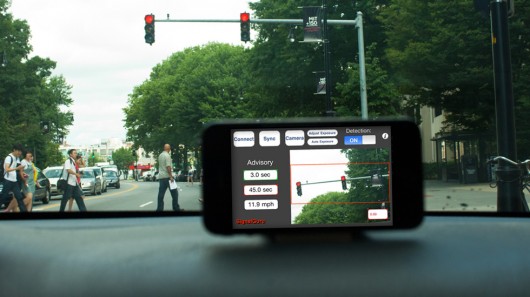
SignalGuru
But what if drivers didn't have to stop at all? What if there were an app that could keep cars chugging along, leveraging the power of their momentum to save gas -- and by extension, money and CO2 emissions? We may not have to wonder much longer, because researchers at MIT and Princeton are building such an app right now.
The software is called SignalGuru, and it's being spearheaded by MIT visiting researcher Emmanouil Koukoumidis. In a nutshell, SignalGuru uses smartphones to time stop lights and suggest that drivers approaching intersections slow down -- or perhaps duck down side streets -- to avoid complete stops. So for example, if you're moving toward an intersection at 25 mph, SignalGuru might analyze data from nearby drivers, match it to the particular traffic light's timing, and suggest that you drop your speed to 20 mph to keep from stopping.
Of course, there are numerous problems SignalGuru has to overcome before it's fully viable -- not least of which is the timing of traffic lights. However, in cases where lights run on a set schedule, SignalGuru has performed very well, predicting changeover times within 2/3 of a second accuracy. Even in the case of variably timed lights, SignalGuru has predicted changeovers with an accuracy of plus-or-minus two seconds.
The results? In Cambridge, Massachusetts, drivers who used SignalGuru in a pilot program saw a boost in fuel economy of 20%. That's substantial.
Our take
As nifty as SignalGuru seems, we're not entirely sure how it will be able to account for other, less structured variations in traffic flow, including the idiosyncrasies of other drivers. And during rush hour, it may be entirely useless: sometimes, you just have to sit through gridlock. In such cases, a simple start-stop system may prove more efficient.
However, as we've seen from other crowdsourced apps like Waze, relying on info from other drivers can have its benefits. In the case of SignalGuru, it's possible that the app could be used like a poor-man's vehicle-to-vehicle system, keeping drivers safer and helping them driver smarter.
Even more interesting, as Koukoumidis points out, is SignalGuru's integration of the smartphone's forward-facing camera. (This is the second time we've seen the camera at the center of a traffic app -- the first being iOnRoad's collision avoidance program.) In SignalGuru's case, the camera could be used to scan gas signs and share news about low gas prices, or even identify open parking spots.
Bottom line: at the moment, this technology is in its very early stages, but with development and adaptation, it may have some very interesting payoffs down the line.
[MIT]
